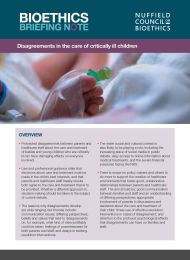Disagreements in the care of critically ill children
Policy Briefing
Published 03/04/2019

Cultural and social contexts
There are several wider societal and cultural factors that might be playing a role in the development of disagreements about the care of critically ill babies and young children.
- Advances in medicine mean that many children who otherwise would have died soon after birth can now be kept alive on ventilators and through other life sustaining interventions.
- Healthcare staff can find it difficult to initiate frank and open discussions about death and dying. There is a tendency to avoid having direct conversations about death across society more generally.35
- There is easy access to a range of online information, of varying quality, about medical conditions and treatments, including experimental treatments and treatments that might be available in other countries (see Box 3).
- There is a range of views on how to approach decisions about the care and treatment of a critically ill babies and young children. Differences in approaches to ethical dilemmas in medicine can be particularly marked between different countries and across different religions.36
- Social media is having increasing prominence in people’s lives. It presents avenues for parents to express their concerns and anxieties, garner support, and crowdfund to cover legal costs and costs of treatment not offered by the NHS. It enables other people and organisations around the world to promote their views, agendas and services.38 There are calls for robust regulation and scrutiny of social media companies.
- The NHS is facing severe financial pressures, with most trusts across England, for example, spending over their budgets. As in other areas of healthcare, it is not always clear how limited resources are, or should be, taken into account in decisions about the provision of care and treatment for critically ill children.
References
Some references are included within the text. For a full list of references, download the PDF.
35 See, for example, Gawande A (2014) Being mortal: medicine and what matters in the end; Royal College of Physicians (2018) Talking about dying: how to begin honest conversations about what lies ahead; Mannix K (2018) With the end in mind: dying, death and wisdom in an age of denial.
36 Orfali K (2004) Parental role in medical decision-making: fact or fiction? A comparative study of ethical dilemmas in French and American neonatal intensive care units Soc Sci Med 58: 2009-22; Vincent J-L (2004) Ethical principles in end-of-life decisions in different European countries Swiss Med Wkly 134: 65–68; Bülow H et al. (2008) The world’s major religions’ points of view on end-of-life decisions in the intensive care unit Intensive Care Med 34: 423-30; Paris JJ (2017) The Charlie Gard case: British and American approaches to court resolution of disputes over medical decisions Journal of Perinatology 37: 1268–71.
38 Bhatia N (2018) Disagreements in the care of critically ill children: emerging issues in a changing landscape; Das R (2018) Populist discourse on a British social media patient-support community: The case of the Charlie Gard support campaign on Facebook Discourse, Context & Media 24: 76-84.

Share